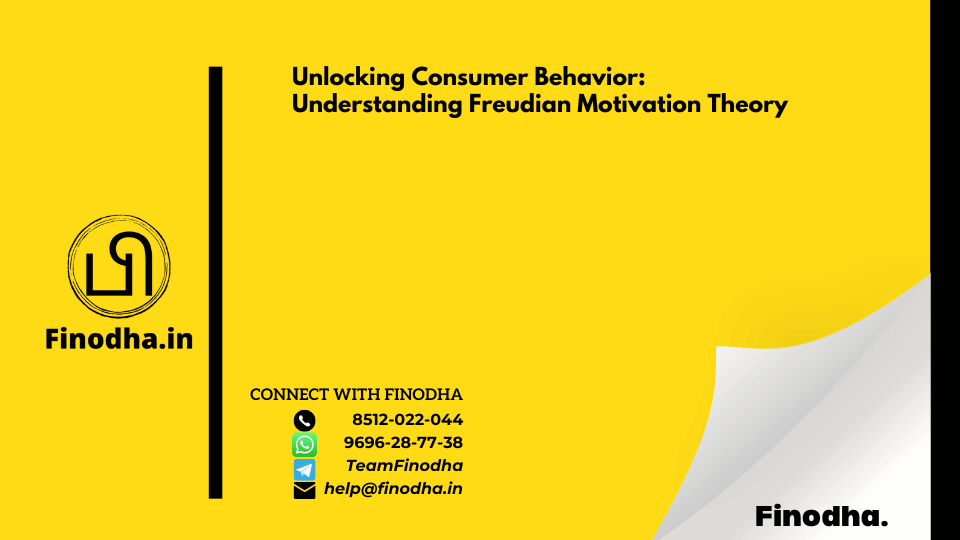Important Keyword: Freudian Motivation Theory, Consumer Psychology, Unconscious Motivations, Marketing Strategies.
Table of Contents

Introduction to Freudian Motivation Theory
Freudian Motivation Theory, rooted in the pioneering work of Sigmund Freud, provides a profound understanding of human behavior through the lens of unconscious psychological forces. Developed in the late 19th and early 20th centuries, Freud’s theories revolutionized the fields of psychology and psychoanalysis, positing that human actions are often driven by hidden motives and desires that lie beneath conscious awareness. This theoretical framework holds significant implications for understanding consumer behavior, as it illuminates the often-invisible factors that influence individuals’ purchasing decisions.
At the core of Freudian Motivation Theory is the concept that human behavior is largely governed by unconscious drives, particularly the id, ego, and superego. The id represents our primal instincts and desires, which often prioritize immediate gratification. In contrast, the ego navigates the demands of reality while the superego embodies social norms and morals. This internal dynamic can heavily influence individual choices, including those related to consumption, where desire and restraint may conflict.
Understanding these unconscious motivations is crucial for marketers and businesses seeking to connect with consumers on a deeper level. By recognizing the underlying psychological triggers that drive purchasing behavior, marketers can create more effective campaigns and strategies. For example, emotions such as fear, pleasure, or longing can significantly influence consumer preferences, often in ways that individuals may not be consciously aware of. Therefore, leveraging insights from Freudian Motivation Theory allows businesses to cater to these hidden needs, ultimately shaping consumer choices in ways that are subtle yet impactful.
In summary, Freudian Motivation Theory offers valuable insights into the complex interplay between unconscious motivations and consumer behavior. By acknowledging the role of psychological forces in decision-making processes, marketers can better understand and engage with their target audiences, enhancing their overall effectiveness in the marketplace.
The Structure of the Human Psyche
Sigmund Freud, a pioneer in the field of psychology, proposed a model of the human psyche that encompasses three primary components: the id, ego, and superego. Each of these components plays a distinct role in shaping human behavior, including the motivations that drive consumer choices.
The id is the most primitive part of the psyche, representing the inherent and instinctual drives. It is entirely unconscious and is responsible for our basic biological urges, such as hunger, thirst, and sexual desire. The id seeks immediate gratification without consideration for consequences or social norms. In consumer behavior, the id can be seen in impulsive purchasing behaviors, where the immediate desire for a product overrides any rational thought about necessity or value.
Contrastingly, the ego serves as the mediator between the id and the external world. It operates on the reality principle, meaning it takes into account the demands of reality and social expectations. The ego processes and incorporates external feedback, allowing individuals to make calculated decisions that align with societal norms. In the context of consumer behavior, the ego can influence consumers to evaluate options more critically, assessing product quality, price, and long-term benefits before making a purchase.
Lastly, the superego represents the moral compass and internalized societal values. It encompasses the ideals and standards that individuals aspire to follow, often leading to feelings of guilt or pride based on whether their actions align with these principles. The superego informs consumer behavior by guiding ethical considerations, such as choosing sustainable products or brands that align with personal values.
Understanding these three components—the id, ego, and superego—provides valuable insight into consumer behavior. Each element contributes to the complexity of decision-making processes, showcasing how instinctual drives, rational thought, and moral considerations interplay in the choices consumers ultimately make.
Conscious vs. Unconscious Motivations
Consumer behavior is often driven by a complex interplay between conscious and unconscious motivations. Conscious motivations refer to the deliberate and rational reasons a consumer utilizes to make choices, such as the desire for functionality, quality, and value. For instance, when purchasing a car, consumers may prioritize fuel efficiency, safety ratings, and price. This evident thought process demonstrates how individuals engage with their surroundings and make choices based on tangible, practical criteria.
On the other hand, unconscious motivations delve into deeper psychological aspects that influence consumer decisions. These motivations might include emotional responses, personal experiences, and societal influences that a consumer may not be explicitly aware of during the decision-making process. For instance, a consumer purchasing a luxury watch may be fulfilling an unconscious desire for status and prestige rather than focusing solely on the watch’s functionality or quality. This hidden longing illustrates how unconscious motivations can manifest in consumer behavior, often leading to choices that prioritize emotional fulfillment over practical needs.
Real-life examples further enhance the understanding of these dual motivations. The advertising industry frequently exploits this knowledge by appealing to both conscious and unconscious desires. For example, brands may market a sports drink by showcasing its effectiveness in quenching thirst and enhancing athletic performance but also evoke emotions tied to inclusion and camaraderie among athletes. This strategy highlights how conscious appeal to health and performance combines with an underlying unconscious desire for social acceptance. In effect, consumer behavior becomes a tapestry woven from both conscious and unconscious threads, ultimately guiding purchasing decisions in nuanced and unpredictable ways.
Applications in Marketing and Consumer Research
Freudian Motivation Theory offers invaluable insights for marketers seeking to understand the underlying factors that influence consumer behavior. By delving into the subconscious motives that drive purchasing decisions, professionals can craft more effective marketing strategies. One of the primary applications of this theory in consumer research involves identifying hidden desires and emotions that may not be immediately apparent through traditional survey methods.
Several research techniques stem from Freudian concepts, with role-playing and word association being particularly effective. Role-playing allows participants to engage in scenarios that resemble real-life purchasing situations, providing marketers with a deeper understanding of the emotional triggers behind consumer preferences. For instance, a company launching a new fragrance may have participants embody scenarios related to the brand’s messaging, revealing unconscious associations and desires tied to scent and identity.
Word association exercises are another effective method, tapping into the immediate thoughts and feelings evoked by specific brands or products. By presenting consumers with prompt words related to their product, researchers can analyze responses to uncover deeper motivations. For example, presenting the word “luxury” might yield responses that reveal Aspirational, status-driven purchasing habits that can inform branding and advertising strategies.
Practical examples of businesses leveraging Freudian Motivation Theory can be observed in various industries. Luxury brands often appeal to consumers’ desires for status and exclusivity, using imagery and language that resonates with aspirational lifestyles. Additionally, companies in the health and wellness sector may focus on consumers’ fears and anxieties regarding personal well-being, crafting messaging that speaks to their deeper concerns and aspirations for a better quality of life.
Understanding Freudian Motivation Theory equips marketers with essential insights necessary to engage consumers on a psychological level, ultimately enhancing their product marketing strategies and branding efforts.
Case Studies: The Impact of Freudian Theory on Purchasing Decisions
Freudian Motivation Theory has played a crucial role in shaping marketing strategies across various industries by appealing to the unconscious desires and motivations that drive consumer behavior. One notable case study can be found in the luxury fashion sector, exemplified by the brand Louis Vuitton. The company has adeptly utilized Freudian concepts of desire and identity to position its products as symbols of status and prestige. Through targeted marketing campaigns, Louis Vuitton creates narratives that evoke a sense of aspiration, tapping into consumers’ unconscious motivations for social recognition, ultimately leading to increased purchasing decisions.
Similarly, the automotive industry presents a compelling illustration of Freudian principles in action. Porsche, a brand synonymous with performance and luxury, focuses on highlighting the emotional experiences associated with driving its vehicles. By emphasizing feelings of power, freedom, and exclusivity in their advertising, Porsche effectively connects with the consumers’ unconscious desires for dominance and adventure. This alignment with deep-seated psychological needs enhances brand loyalty, as customers perceive owning a Porsche as a pathway to fulfilling their aspirations.
Furthermore, in the realm of beauty products, the brand Dove offers an interesting case study on how Freudian Theory can impact purchasing decisions by leveraging the theme of self-esteem and acceptance. Dove’s “Real Beauty” campaign challenged traditional beauty standards, resonating with consumers’ desires for authenticity and self-worth. By promoting empowerment and body positivity, Dove tapped into the unconscious motivations related to self-image and societal acceptance, resulting in increased sales and an emotional connection with consumers.
These case studies exemplify how brands across various sectors have successfully harnessed Freudian Motivation Theory to appeal to the psychological needs of consumers. By understanding and addressing the deeper motivations behind purchasing decisions, these companies effectively foster brand loyalty and drive sales in an increasingly competitive market.
Advantages of Freudian Motivation Theory
Freudian Motivation Theory offers significant advantages when applied to consumer research and marketing strategies. One of the primary benefits is its focus on the unconscious motivations that drive consumer behavior. Understanding these underlying psychological factors enables marketers to create targeted campaigns that resonate deeply with their audience. By tapping into the non-rational aspects of decision-making, businesses can craft messages that align more closely with their consumers’ implicit desires and fears, ultimately leading to a more emotional connection with their products.
Another prominent advantage is the potential for enhanced customer satisfaction. When marketers leverage insights from Freudian theory, they can design offerings that fulfill not only the functional needs of consumers but also their psychological needs. This dual approach ensures that products and services meet the deeper desires of consumers, leading to heightened satisfaction and repeat purchases. Satisfied customers are more likely to become brand advocates, which significantly contributes to positive word-of-mouth and organic growth.
Furthermore, employing Freudian Motivation Theory can bolster brand loyalty. By understanding the emotional triggers that foster attachment, brands can cultivate relationships that go beyond mere transactional interactions. Brands that align their strategies with the intrinsic motivations of consumers are more likely to inspire loyalty and commitment. This is particularly relevant in highly competitive markets where differentiating factors hinge on the emotional ties consumers form with brands.
Lastly, integrating Freudian principles can improve overall sales performance. When marketing efforts are informed by a deep psychological understanding of consumers, results often reflect in increased engagement rates and higher conversion rates. Brands can ultimately drive sales by strategically positioning their products to connect with consumers on a subconscious level, reinforcing the significance of Freudian Motivation Theory in modern marketing practices.
Challenges and Critiques of Freudian Motivation Theory
While Freudian Motivation Theory has significantly influenced marketing strategies and consumer behavior analyses, it is not without its challenges and critiques. One of the primary concerns regarding this theory is its over-reliance on unconscious factors. Freud posited that much of human behavior is driven by unconscious motives, which can be difficult to measure and quantify. This reliance raises questions about the validity of the insights derived from the theory when applied to practical marketing contexts. For marketers, the challenge lies in designing campaigns that effectively resonate with consumers while being rooted in subjective interpretations of unconscious desires.
Furthermore, the subjective nature of identifying these unconscious motivations poses additional drawbacks. Individual motivations can vary widely despite the seemingly universal themes identified by Freud, which complicates market segmentation strategies. What motivates one consumer may be entirely different for another, yet Freudian theory tends to generalize these motivations. This could lead marketers to rely on assumptions rather than actual consumer insights, potentially resulting in strategies that miss their mark. Critics argue that the application of Freudian concepts in marketing may not accurately reflect contemporary consumer dynamics, which can be influenced by a broader range of social, cultural, and economic factors.
Another critique involves the ethical implications of manipulating unconscious desires. Marketers must tread carefully to avoid strategies that could be perceived as manipulative or exploitative. The line between appealing to deep-seated motivations and taking advantage of consumer psychology can be thin. As such, it is crucial for marketers to consider the ethical dimensions of applying Freudian Motivation Theory, particularly in an era where consumers are increasingly aware of psychological tactics.
In summary, while Freudian Motivation Theory provides valuable frameworks for understanding certain consumer behaviors, it is vital to approach its application with a critical mindset, acknowledging its limitations and the ethical considerations it entails.
Practical Tips for Marketers
Understanding Freudian motivation theory can greatly enhance marketing strategies by revealing the underlying desires that drive consumer behavior. Marketers can effectively apply this theory by incorporating techniques that uncover these deeper motivations and align their marketing efforts accordingly. Here are several actionable tips that can be utilized.
First, conducting thorough market research is vital. Utilize surveys, focus groups, or interviews to gain insights into the emotional triggers of consumers. Questions should be designed to explore desires, fears, and aspirations, as these aspects align closely with Freudian theory. Through qualitative data, marketers can identify themes that resonate with consumers, ultimately guiding campaign development.
Next, storytelling is a powerful technique to engage consumers on a deeper level. Craft narratives that evoke emotions and connect with the audience’s subconscious desires. For instance, a brand may share stories of individuals overcoming obstacles, which can resonate with potential buyers’ personal experiences. This emotional connection helps to foster brand loyalty and encourages consumers to align themselves with the brand’s values.
Additionally, visuals play a crucial role in conveying deeper meanings. Utilize compelling imagery that reflects the subconscious desires identified in research. Color psychology can also be applied, as different hues evoke various emotions; for example, blue can convey trust while red can stimulate excitement. This strategic use of visuals can create a more engaging and relatable brand image.
Lastly, continuously analyze and adapt marketing strategies based on feedback and performance metrics. Monitor consumer responses to campaigns and adjust tactics to better align with their core motivations. By staying adaptive, marketers can ensure that their messaging remains relevant and impactful, thus enhancing overall consumer engagement and driving sales success.
Conclusion: The Future of Consumer Motivation Understanding
As we reflect on the insights imparted by Freudian Motivation Theory, it becomes clear that this psychological approach holds transformative potential for understanding consumer behavior. This theory, rooted in the depths of the human psyche, reveals the underlying motivations that drive purchasing decisions. Through the lens of Freudian concepts such as the id, ego, and superego, marketers are equipped to decode the complex interplay of emotional and rational factors influencing consumers.
In an evolving market landscape characterized by rapid change and increasing competition, the relevance of Freudian Motivation Theory cannot be overstated. As consumers become more aware of their desires and motivations, businesses must adapt their strategies to connect with these deeper psychological drivers. By tapping into the subconscious desires that shape consumer choices, marketers can develop more effective messaging that resonates on a personal level.
Furthermore, understanding the motivations behind consumer behavior allows brands to craft experiences that appeal to both emotional and rational aspects of decision-making. This holistic approach not only enhances customer engagement but also fosters brand loyalty in a crowded marketplace. As businesses strive to differentiate themselves, harnessing the insights from Freudian Motivation Theory can lead to innovative marketing strategies that effectively address consumers’ intrinsic needs and desires.
In conclusion, as we move forward into a future shaped by continuous shifts in consumer preferences, it is imperative for marketers to embrace the principles of Freudian Motivation Theory. By integrating these psychological insights into their strategies, brands can better navigate the complexities of consumer behavior and cultivate lasting connections with their audiences. The journey towards understanding consumer motivations has only just begun, and those who leverage these insights will undoubtedly gain a competitive edge in the marketplace.
Download Pdf: https://taxinformation.cbic.gov.in/





0 Comments